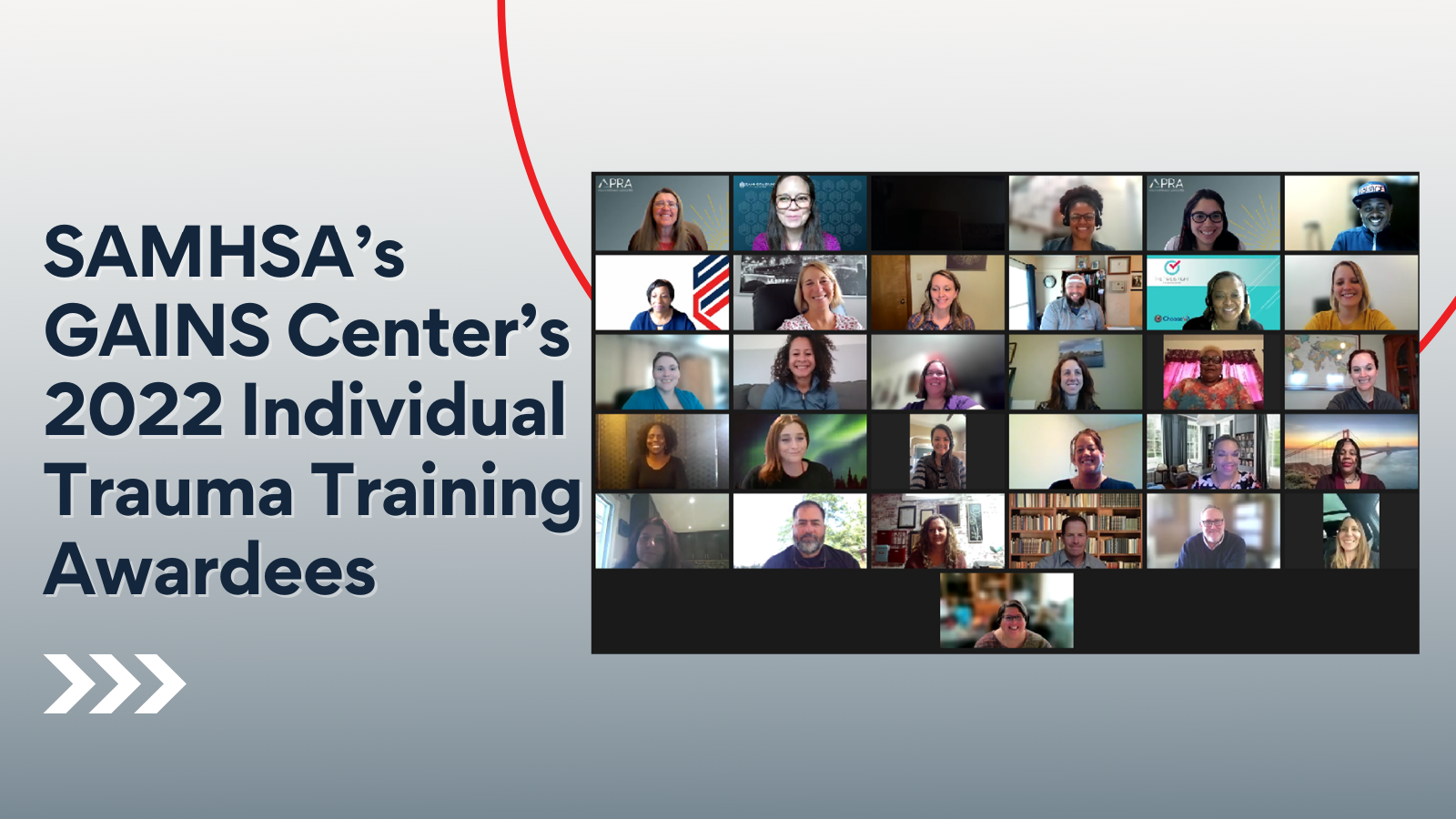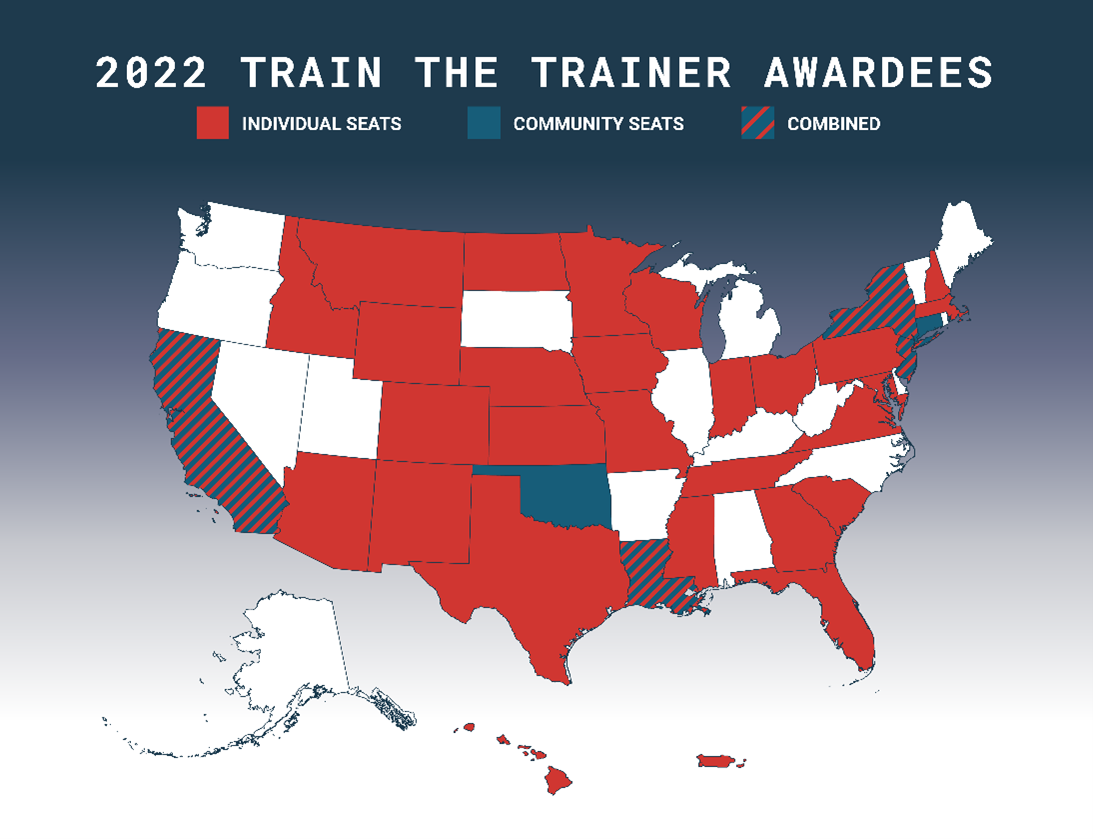Since 2012, SAMHSA’s GAINS Center has provided train-the-trainer (TTT) workshops through its How Being Trauma-Informed Improves Criminal Justice Responses curriculum. This 4-hour training was designed by Policy Research Associates, Inc., which operates SAMHSA’s GAINS Center. The training aims to increase knowledge of what trauma is and begin building a skillset for trauma-informed responses among criminal justice and behavioral health providers who serve individuals who are system impacted. The 2-day TTT event equips trainers with all the information and materials they will need to deliver this training to their communities effectively. Appropriate community audiences include law enforcement officers, correctional officers, park rangers, behavioral health treatment providers, jail medical staff, judges, prosecutors, defense attorneys, and community corrections officers. Ideal applicants have worked in the criminal justice system or with the criminal justice-involved adult population for a minimum of 3 years, have delivered at least 40 hours of professional or educational training, and have the capacity to facilitate future trainings in their agencies and communities.
Every year, the GAINS Center solicits applications from experienced trainers interested in developing their capacity to provide trauma-informed training in their local agencies or communities. To qualify, each applicant must submit a trainer application, a resume, and two letters of reference. Each application is reviewed and scored by two GAINS Center staff members. High-scoring applicants are then reviewed by a team of GAINS staff who identify the final awardees, and SAMHSA staff provide final approval.
An estimated 2,400 individuals have been trained, that includes individuals trained in the GAINS Center individual and community events and through other mechanisms. In response to the 2022 individual solicitation posted in January, 153 people submitted applications. Of those applicants, 80 awardees were selected to participate in one of the 3 training sessions in 2022. This year’s training application reviewers prioritized applicants with clear plans to provide training to drug courts or reentry programs in their community. Of those selected to receive an award, 65 percent plan to deliver training to drug courts and reentry programs.
The GAINS Center also provided preference to applicants serving marginalized and underserved populations. Populations served by awardees include individuals identifying as Native Hawaiian, Native American, and other Black, Indigenous, and people of color; emerging adults; rural and frontier communities; immigrants and refugees; Veterans; LGBTQ+ people; and people experiencing homelessness. Nearly a quarter of those awarded identified as having lived experience of substance use or incarceration. Awardees are dispersed across 33 states, including urban, rural, suburban, and frontier regions, and one attendee is in Puerto Rico.
Like the individual applications, the community TTT applications in 2022 were numerous and of high quality. However, due to capacity limits, the GAINS Center could not award all qualified communities a full community TTT. To expand the reach of the trauma training, the GAINS Center offered six communities two seats each at one of the three individual TTT sessions being offered in 2022. Thus, 12 people from 6 states are expected to attend the individual TTT sessions as proxies for their community.
The TTT training sessions are delivered over 2 days. Participants are provided with a dynamic and interactive opportunity to receive the curriculum and comprehensive instructions on training others. What to Expect in a Trauma Training Event details the activities planned for the 2 days.
There are three virtual individual TTT sessions scheduled for April, May, and June 2022. The April cohort of newly trained trainers has been certified as of this publication. Following the delivery of the April 2022 training, participants shared their motivation to apply for this training, lessons learned throughout the 2 days, and their plans to implement this content in their communities.
 Nydia Thomas, Attorney and Director of Training with Lone Star Justice Alliance (LSJA) in Austin, Texas, reported that she loved how [the GAINS Center] modeled the training, starting with the delivery of the modules followed by the going through the binder step by step. Nydia felt that the information and resources shared were valuable. She summarized the training as “refreshing and [she is walking] away with a strong foundation.” Nydia plans to work closely with LSJA Chief Innovations Officer Yulise Reaves Waters to train internal staff at the LSJA and expand the training to other criminal justice stakeholders, including defense counsels throughout the state.
Nydia Thomas, Attorney and Director of Training with Lone Star Justice Alliance (LSJA) in Austin, Texas, reported that she loved how [the GAINS Center] modeled the training, starting with the delivery of the modules followed by the going through the binder step by step. Nydia felt that the information and resources shared were valuable. She summarized the training as “refreshing and [she is walking] away with a strong foundation.” Nydia plans to work closely with LSJA Chief Innovations Officer Yulise Reaves Waters to train internal staff at the LSJA and expand the training to other criminal justice stakeholders, including defense counsels throughout the state.
 Ingrid Mahogany, Reentry Outreach Coordinator with Jubilee Housing in Washington, DC, described the training as impactful, enlightening, and humbling. It provided her with additional tools to do her job better: “empowering our residents, treating them with even more dignity and respect, and learning to approach them with caution to avoid re-traumatizing; it [the training] has been very powerful.” Ingrid’s goals include using the tools and lessons learned in a professional and personal setting to enhance her care with those she encounters.
Ingrid Mahogany, Reentry Outreach Coordinator with Jubilee Housing in Washington, DC, described the training as impactful, enlightening, and humbling. It provided her with additional tools to do her job better: “empowering our residents, treating them with even more dignity and respect, and learning to approach them with caution to avoid re-traumatizing; it [the training] has been very powerful.” Ingrid’s goals include using the tools and lessons learned in a professional and personal setting to enhance her care with those she encounters.
 Tasca Tolson, Med, PLPC, CADC, BIP, from Columbia, Missouri, explained that her motivation to become a trainer was the desire “to provide my clients and my community with the best information possible. We have had lots of shootings, [and an] increase in overdoses, suicides, and domestic violence in my community. I want to help us all heal.” Tasca believes “that leading with your listening ears and using a trauma-informed perspective allows individuals to have an optimal level of life functioning.” As a result of the training, Tasca reported she, “learned how unresolved trauma affects all levels of functioning and how the failure to use trauma-informed services puts everyone at risk.” Her goal includes training criminal justice stakeholders such as courts, probation and parole officers, and reentry organizations.
Tasca Tolson, Med, PLPC, CADC, BIP, from Columbia, Missouri, explained that her motivation to become a trainer was the desire “to provide my clients and my community with the best information possible. We have had lots of shootings, [and an] increase in overdoses, suicides, and domestic violence in my community. I want to help us all heal.” Tasca believes “that leading with your listening ears and using a trauma-informed perspective allows individuals to have an optimal level of life functioning.” As a result of the training, Tasca reported she, “learned how unresolved trauma affects all levels of functioning and how the failure to use trauma-informed services puts everyone at risk.” Her goal includes training criminal justice stakeholders such as courts, probation and parole officers, and reentry organizations.
 Destenie Commuso, CPSWS, RISE Reentry Specialist from Lincoln, Nebraska, disclosed having lived experience of trauma both as a child and an adult. She recognizes that no trauma is the same and that survivors can wear their experiences differently. Her practice has been to advocate and educate. She says, “when we educate ourselves and others on trauma-informed care and trauma responses, we practice what we preach. I will always be a HUGE trauma-informed care advocate because I believe we can change a lot in less time and [reduce the risk of] retraumatization if we screened for trauma and then do something with what we learned.”
Destenie Commuso, CPSWS, RISE Reentry Specialist from Lincoln, Nebraska, disclosed having lived experience of trauma both as a child and an adult. She recognizes that no trauma is the same and that survivors can wear their experiences differently. Her practice has been to advocate and educate. She says, “when we educate ourselves and others on trauma-informed care and trauma responses, we practice what we preach. I will always be a HUGE trauma-informed care advocate because I believe we can change a lot in less time and [reduce the risk of] retraumatization if we screened for trauma and then do something with what we learned.”
Every year, the GAINS Center looks for applicants with a strong desire to help local communities realize positive systems change. Individuals, communities, or agencies interested in participating in a future trauma training event may apply when SAMHSA’s GAINS Center solicits applications for communities in the fall and individuals in the winter. However, training is also available via trained trainers in your state or through PRA. Search for a trainer in your area or contact the GAINS Center about setting up a How Being Trauma-Informed Improves Criminal Justice Responses training.
Like what you’ve read? Sign up to receive the monthly GAINS eNews!



